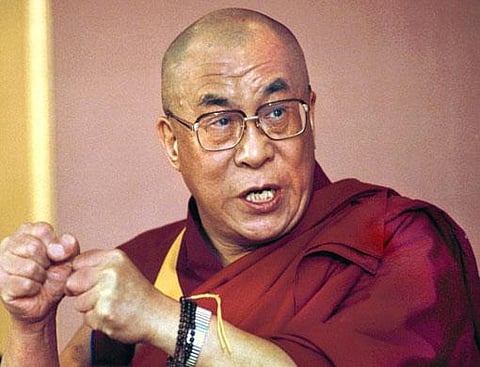Dalai Lama's burden
Talk of the Tibetan spiritual eader 'retirement' has pleased China, but his presence offers Beijing the best chance of reconciliation

Enthroned in a maroon and saffron pavilion, the 14th Dalai Lama chuckled often as he preached to the football stadium, though his text was not taken from the jolly slogan behind him: ‘Play soccer for world peace'.
Ringed by snowcapped Himalayan peaks in Gangtok, capital of the Indian state of Sikkim, which borders Tibet, tens of thousands basked in midwinter sunshine — local Sikkimese of Nepalese and ethnic-Tibetan descent, visitors and, of course, Tibetan exiles.
The Dalai Lama may exaggerate a bit when he says that 99 per cent of Tibetans trust him. But not by much. So his recent talk of "retirement" has unnerved many.
In November he said he was seriously thinking of retiring. An election in 2001 for his government-in-exile had already ended the 400-year tradition of Dalai Lamas as both spiritual and political leaders.
After an election in March this year, he would discuss with the new parliament when to give up his remaining "temporal" role. He expected to retire in the "next few months".
Politics, however, will not let Tibet's spiritual leader go. His presence in Sikkim was in itself a measured gesture of Indian defiance towards China. China long refused to recognise Sikkim's incorporation into India, though since 2004 Chinese maps have shown it as an Indian state, and in 2006 a modest border trade began.
The Dalai Lama's eight-day tour of Sikkim was pointedly timed to come just after Chinese Prime Minister Wen Jiabao had been in Delhi, discussing how to improve ties. Tibet remains one of the strains. The Dalai Lama, with some 100,000 followers, has made his home in India since fleeing Lhasa, Tibet's capital, in 1959.
Those exiles, and another six million Tibetans under Chinese rule, make it impossible for the Dalai Lama to quit politics altogether. He remains the only Tibetan they can trust to marshal the international sympathy that keeps their cause alive. Yet China's refusal to talk seriously to his representatives about the future of Tibet seems perverse.
Shunning violence
For over 20 years he has demanded not the independence many Tibetans crave, but greater autonomy. Probably he alone could make many Tibetans accept this. Moreover, he is a pacifist. China wrongly blamed him for the ferocious ethnic attacks on Han Chinese in riots in Lhasa, in 2008. Without his restraining influence, violence would have been far more frequent.
For China, however, the solution to its Tibetan problem is the end of the 14th Dalai Lama. It may be right that when he retires or dies — and though in rude health, he will turn 76 this year — the Tibetan cause will suffer a terminal blow.
Even an undisputed new Dalai Lama would for decades be too young for a political role. In the interim, many Tibetans expect much of another Karmapa Lama, Ogyen Trinley Dorje, who is recognised by both the Dalai Lama and the Chinese government.
The school of Tibetan Buddhism he heads has just been celebrating its 900th anniversary in India at Bodh Gaya, site of the bodhi tree under which the Buddha attained enlightenment. So the Karmapas' lineage is even longer than the Dalai Lamas'. Ogyen Trinley, just 25, is an impressive and engaging figure, who has inherited a big foreign following.
He has two problems, however. Yet again, his status is contested with a rival candidate, also in India, and some fishiness about the identification of the infant Ogyen Trinley.
Second, India is suspicious of him. Born in Tibet itself and feted in his youth by the Chinese authorities, he made a dramatic flight to India 11 years ago. Some fear China connived in his escape, hoping to sow discord among exiled Tibetans. That has been the effect, if not the intention.
China may calculate that, after the Dalai Lama, the Tibetan exile movement will lose itself in infighting. But that is all the more reason to deal with him. China's control of Tibet is not in doubt. What it lacks is the acquiescence of Tibetans. The Dalai Lama offers the best chance of reconciliation.
Three weeks after his "retirement" remarks, the simple monk clarified his position. He had only, he said, been referring to some ceremonial functions — signing documents and so on.
Like every Tibetan, he has a responsibility he may not shirk. Talk of his standing down, he said, had caused "anxiety" and "confusion", including inside Tibet.
Sign up for the Daily Briefing
Get the latest news and updates straight to your inbox


